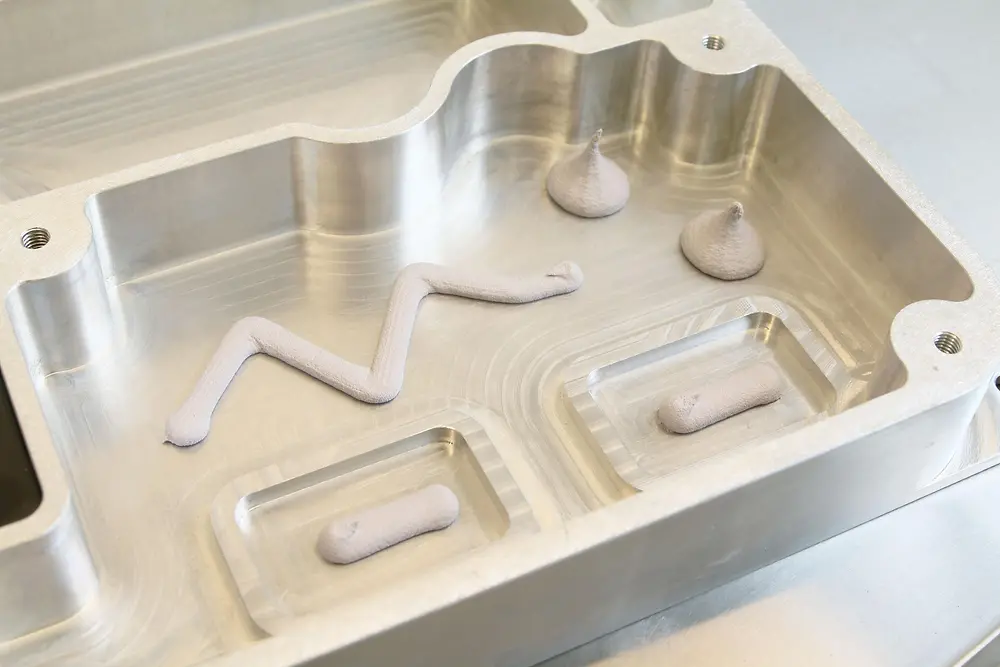Henkel launches 7.0 W/mK liquid gap filler aligned with mass production requirements of automotive electronics and power conversion electronics
Henkel today announced the debut of its latest thermal interface material (TIM) innovation, Bergquist Gap Filler TGF 7000 (image). The liquid TIM is a major formulation breakthrough, as it effectively marries high thermal conductivity of 7.0 W/mK with a maximum possible speed tested of 18 grams per second, a combination which is currently the only one of its kind. With excellent throughput capability, the novel material is well-suited for applications such as automotive ADAS systems, power conversion systems, electric pumps and ECUs where mass production, reliability and high thermal conductivity are required for today’s smaller footprint, higher power designs.
“From a chemistry perspective, engineering a liquid TIM with substantive filler content that also allows fast dispensing is an exceptionally difficult balance to achieve,” explains Holger Schuh, Henkel Global Technology Expert, emphasizing Henkel’s expertise in resin technology and thermal material formulation. “One might expect a liquid material with high thermal conductivity to experience separation, settling, caking and clogging of the dispensing equipment, but Bergquist Gap Filler TGF 7000 exhibits none of these issues.”
A silicone-based, two-part liquid gap filling TIM, Bergquist Gap Filler TGF 7000 dispenses quickly at a maximum possible tested speed of 18 grams per second and cures in place at room temperature. The 7.0 W/mK material is soft upon cure to minimize stress and has controlled volatility with siloxane content below 300 parts per million (ppm) to provide compatibility with various bonding surfaces and optical components. In addition, manufacturers benefit from risk-free logistics, as storage stability and easy handling are also key attributes. Having cultivated solid technology partnerships with the industry’s leading dispensing equipment suppliers, Henkel’s technical team is well-versed on liquid TIM material optimization for various equipment platforms, which is also critical for volume manufacturing success. Working with dispense partners throughout Bergquist Gap Filler TGF 7000’s formulation, significant testing was conducted to validate the dispensability of the product.
“High-performance liquid gap fillers set high requirements on the dispensing technology: to ensure a precise application without rising the working pressure or to engineer a durable resin circuit that can cope with high-abrasive fillers. With our eccentric screw pumps and static mixing system Duplex+, we are able to set up a high-volume dispensing process with excellent cmk-results and cycle times”, says Florian Schütz, Regional Sales Manager DACH from Bdtronic. “Unlike common expectations for higher thermally conductive materials, the material has shown outstanding characteristics in dispensing without stressing the equipment during our early dispensing tests.”
To further evaluate the material within various environments, Henkel has engaged well-respected industry research firm, ZFW Stuttgart (Zentrum für Wärmemanagement). Using innovative thermal analysis and measurement technology, the institute studied the thermal performance of the TGF 7000 under various stress situations. Results of this analysis, as well as details about the design considerations, testing methods, and thermal and mechanical properties of Bergquist Gap Filler TGF 7000 will be shared during a live webinar presentation with Henkel, Bdtronic and ZFW on June 30, 2020. To register, visit the Henkel website here.
“For next-generation automotive designs where form and function are inherently linked, smaller, high-power components are enabling lighter, sleeker and more sophisticated vehicles,” says Schuh in conclusion. “Without effective thermal control solutions like our new Gap Filler, these advances would not be possible.”







